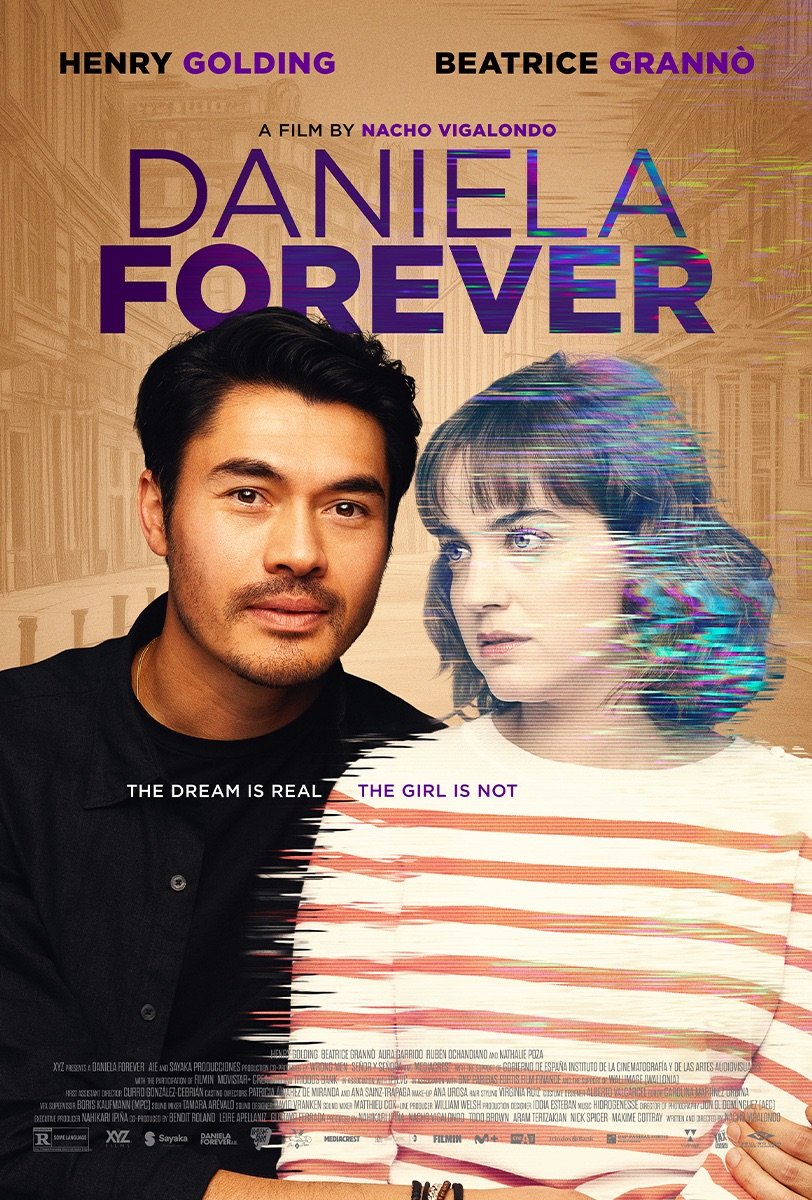Losing someone is never easy. In Daniela Forever, Nicolás (Henry Golding) meets and loses the girl of his dreams, Daniela (Beatrice Grannò), and tries an experimental drug to ease the grieving process. Now, while this might seem like an unusual way to mourn someone, Daniela Forever is written and directed by Nacho Vigalondo, who is known for taking an unconventional look at societal issues.
Nicolás is a DJ in Madrid spinning at local venues when he meets Daniela. The beginning of the movie shows the audience images of their first meeting, and it is being narrated by Daniela and Nicolás. It is a little strange because you are unsure why the dialogue is being spoken, and why they are talking about it in the past tense. During this sequence, an incident occurs that makes Nicolás wake up, and the film ratio changes to a 4:3 aspect.

Nicolás is visited by his friend Victoria (Nathalie Poza), who tells him about an experimental clinic she visited that helped with the grief from her divorce. The clinic practiced a concept known as ‘lucid dreaming,” but it had strict guidelines for anyone willing to participate. Nicolás gets into the program but doesn’t follow the guidelines fully and ends up creating a world where Daniela is still with him. This dream world is just what he wants, but it does have its issues. The ratio aspect of the dream world changes to 16:9. These subtle changes in aspect ratios are created to tell the audience when Nicolás is in the dream world and the real world.
The concept of lucid dreaming has to do with the participant being in a dreamlike state where they know they are in a dream and can control a few aspects of the dream. Nicolás soon learns that certain areas of this dreamworld are blocked off to him because he has not experienced them before. For example, an alleyway that he has never walked down is blocked off because he has not experienced it in real life. To overcome these blocks, he starts exploring more of the city and living his life more fully to make his dream world more well-rounded.
As the movie progresses, the two worlds start to blend, and Nicolás is losing touch with reality. He starts being more possessive of Daniela and uses his words to control her. When she starts doing new things that don’t align with his suggestions to her, he starts erasing her memories but using simple phrases like, “You don’t care about that” or “You have never met this person, so you have no memory of them.” It gets pretty dark in the way he tries to control her, but it ultimately comes back to him.

The visuals in the film are hypnotic. Seeing how the unknown areas become blocked out in front of Nicolás is pretty eerie, to say the least. When he starts experimenting with changing the world around him, we can see how this power is starting to corrupt him. This manipulation of the world can be seen as how he does not want to accept what happened to Daniela. Ultimately, Nicolás has to live in the real world and face that his life will now be different, but what does the real world look like to him after trying to be with Daniela forever?
Final Thoughts: Daniela Forever plays with the notion of keeping someone you lost around forever and the consequences of that wish. Henry Golding gives a fantastic performance as a man who is heartbroken but also spiraling out of control. Beatrice Grannò is captivating as Daniela. Watching this will raise questions about control and where the line is between obsession and mourning.
Violence: There is no violence in the movie.
Kid-Friendly: The movie does deal with a tough issue about loss and grief. There are no bad words, but there is a post sex scene that deals with fantasies.
Grieving the loss of his girlfriend Daniela, Nicolás is consumed by sorrow. He sees a glimmer of hope when he’s offered a chance to participate in a groundbreaking sleep therapy that simulates reality. But as dream and memory blur, he must confront what healing really means—and whether he’s ready to let go. From visionary filmmaker Nacho Vigalondo (Colossal), Daniela Forever is a sci-fi journey through love, loss, and illusion.
